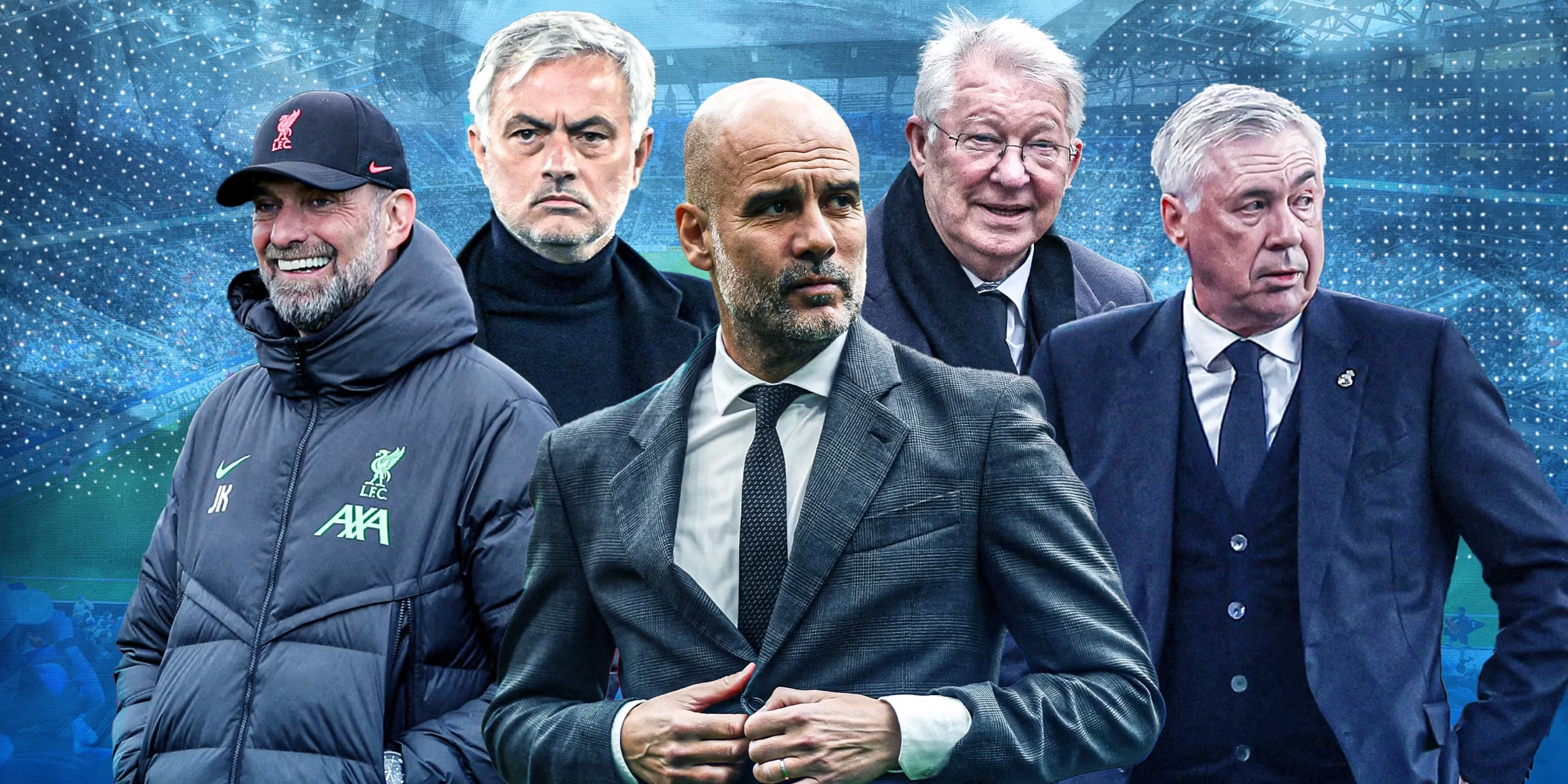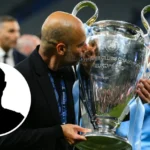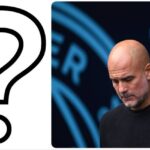Where does Pep Guardiola rank amongst the world’s best managers?

The eternal debate surrounding football’s greatest managers has taken on new dimensions in recent years, particularly following Pep Guardiola’s most challenging season at Manchester City. FourFourTwo’s recent ranking of the world’s top 50 managers has placed the Catalan tactician in fourth position, a placement that has sparked considerable discussion among football enthusiasts and analysts worldwide. This comprehensive analysis examines Guardiola’s current standing among his peers, the factors that have influenced his ranking, and the broader implications for modern football management.
The Current Landscape: FourFourTwo’s Top 4
1. Luis Enrique (Paris Saint-Germain) – 1st Place
The Spanish manager’s ascension to the top spot represents one of the most remarkable turnarounds in recent football history. Luis Enrique’s achievement of leading Paris Saint-Germain to a historic treble has redefined expectations for what constitutes elite management in contemporary football. His tactical flexibility, man-management skills, and ability to handle the pressures of managing global superstars have earned him widespread recognition.
Enrique’s success at PSG is particularly noteworthy considering the club’s previous struggles in achieving European glory. His ability to synchronize the attacking talents of world-class players while maintaining defensive solidity has been exemplary. The historic treble achievement—capturing the Champions League, Ligue 1, and Coupe de France—represents the pinnacle of club football success and explains his current position atop the managerial rankings.
2. Arne Slot (Liverpool) – 2nd Place
The Dutch manager’s meteoric rise to second place reflects the modern football landscape’s appreciation for immediate impact and tactical innovation. Slot’s first season at Anfield has been nothing short of extraordinary, spearheading Liverpool to Premier League glory in what many considered a rebuilding year following Jürgen Klopp’s departure.
Slot’s tactical acumen and ability to seamlessly integrate new systems while maintaining Liverpool’s high-intensity playing style have impressed observers across the footballing world. His success represents the new generation of managers who combine traditional coaching wisdom with modern analytical approaches, creating a blueprint for sustainable success in elite football.
3. Simone Inzaghi (Inter Milan) – 3rd Place
The Italian manager’s consistent excellence and ability to compete at the highest level with relatively modest resources have earned him widespread respect. Despite losing his second UEFA Champions League final in three years, Inzaghi’s tactical sophistication and squad management have been exemplary.
His placement ahead of Guardiola reflects the current emphasis on recent achievements and the ability to maximize squad potential. Inzaghi’s Inter Milan has consistently punched above their weight in European competition, demonstrating tactical flexibility and mental resilience that have become hallmarks of elite management.
4. Pep Guardiola (Manchester City) – 4th Place
Guardiola’s fourth-place ranking represents a significant shift in perception, reflecting both his recent struggles and the evolving criteria for managerial excellence. This positioning, while still acknowledging his immense contributions to football, signals a more nuanced understanding of contemporary managerial success.
Analyzing Guardiola’s Current Position
The Weight of Recent Performance
Guardiola’s ranking has been significantly influenced by Manchester City’s 2024-25 campaign, which he himself acknowledged as the most challenging of his managerial career. The statistics paint a picture of unprecedented struggle for the Catalan manager:
- Premier League Performance: Finishing third with just 71 points represented a dramatic decline from City’s usual standards. This point tally would have been considered respectable for many clubs but fell well short of the expectations associated with Guardiola’s Manchester City.
- European Disappointment: The Round of 16 exit in the UEFA Champions League marked a particularly bitter pill for a manager whose European pedigree had been virtually unquestionable. This early elimination raised questions about tactical adaptability and squad depth management.
- Domestic Cup Failure: The FA Cup final loss to Crystal Palace epitomized the season’s frustrations, with City failing to capitalize on their expected superiority against supposedly inferior opposition.
The Recency Bias Factor
The fourth-place ranking inevitably reflects what could be characterized as recency bias—the tendency to weight recent events more heavily than historical achievements. Guardiola’s extraordinary record across his entire managerial career presents a compelling counter-narrative to this season-focused assessment.
However, this bias isn’t necessarily unfair in the context of modern football management. The sport’s rapid evolution means that past successes, while valuable, must be balanced against current performance and adaptability. Guardiola’s ranking acknowledges both his historical greatness and the reality of his recent challenges.
Historical Context: Guardiola’s Managerial Journey
The Barcelona Revolution (2008-2012)
Guardiola’s managerial career began with perhaps the most successful debut in football history. His Barcelona team didn’t just win trophies; they revolutionized how football was played and perceived. The tiki-taka philosophy, while not entirely original, reached its zenith under Guardiola’s guidance.
Key achievements during this period include:
- Six trophies in his first season (2008-09)
- Two Champions League titles (2009, 2011)
- Three consecutive La Liga titles (2009-2011)
- The development of what many consider the greatest club team in football history
The Bayern Munich Experiment (2013-2016)
Guardiola’s time at Bayern Munich presented different challenges and mixed results. While domestically dominant, his inability to deliver Champions League success raised questions about his tactical approach in knock-out competitions.
The Bayern period was characterized by:
- Three consecutive Bundesliga titles
- Tactical experimentation and evolution
- Champions League disappointments despite domestic dominance
- The development of his positional play concepts
The Manchester City Project (2016-Present)
Guardiola’s Manchester City tenure has been marked by unprecedented domestic success and European frustration until recently. His impact on English football has been profound, elevating the tactical sophistication of the entire league.
Major achievements include:
- Six Premier League titles in eight seasons
- Multiple domestic cup victories
- The historic treble in 2022-23
- Record-breaking point tallies and goal-scoring achievements
Factors Influencing Current Rankings
Tactical Innovation vs. Tactical Rigidity
One factor affecting Guardiola’s current ranking is the perception of tactical rigidity in crucial moments. While his positional play system has been revolutionary, critics argue that his reluctance to adapt tactically in high-stakes situations has cost his teams important matches.
The contrast with managers like Enrique and Slot, who have demonstrated greater tactical flexibility, has influenced their higher rankings. Modern football increasingly values adaptability over systematic perfection, a shift that may not favor Guardiola’s approach.
Squad Management and Rotation
Guardiola’s squad management has come under scrutiny, particularly regarding his handling of player rotation and injury management. The 2024-25 season’s injury crisis exposed potential weaknesses in his approach to squad depth and player workload management.
The comparison with managers who have achieved more with seemingly less talented squads has influenced perception of Guardiola’s abilities. Success with limited resources is increasingly valued in managerial rankings.
European Competition Performance
The emphasis on Champions League success in managerial rankings has worked against Guardiola in recent assessments. His single Champions League victory with Manchester City, despite massive investment, contrasts unfavorably with managers who have achieved European success with more modest resources.
The Broader Context of Modern Management
Changing Expectations
The criteria for managerial excellence have evolved significantly in recent years. Traditional measures like longevity and consistent success are now balanced against immediate impact, tactical innovation, and the ability to handle modern football’s unique pressures.
Guardiola’s ranking reflects this shift in expectations. While his historical achievements remain undeniable, the current focus on recent performance and contemporary challenges has influenced his positioning.
The Rise of the New Generation
The success of managers like Slot and the continued excellence of Inzaghi represent the emergence of a new generation of tactical innovators. These managers have learned from Guardiola’s innovations while developing their own approaches to modern football’s challenges.
This generational shift has implications for how managerial greatness is measured and understood in contemporary football.
Manchester City’s Transitional Period
Structural Changes
Manchester City’s summer of change has been extensive, reflecting the club’s recognition that evolution was necessary. The replacement of Txiki Begiristain with Hugo Viana as director of football signals a new era in the club’s approach to squad building and tactical development.
The departure of long-serving assistant coaches and the arrival of new voices in Pepijn Lijnders and James French suggest a willingness to adapt and evolve. These changes may influence Guardiola’s future ranking as the new system develops.
Player Turnover and Squad Renewal
The significant player turnover, including the departures of Kevin De Bruyne and Scott Carson, represents the end of an era at Manchester City. The early signings of Rayan Ait-Nouri, Marcus Bettinelli, Rayan Cherki, and Tijjani Reijnders indicate a commitment to refresh and revitalize the squad.
This renewal process will be crucial in determining whether Guardiola can return to the top of managerial rankings. The success of these new signings and the manager’s ability to integrate them will be closely watched.
The Club World Cup Factor
Current Performance
Manchester City’s strong performance in the FIFA Club World Cup, with three wins in three group-stage games, has provided some positive momentum. The upcoming Round of 16 tie against Al-Hilal represents an opportunity for Guardiola to demonstrate his ability to compete at the highest level.
Success in this competition could begin to shift perceptions and influence future rankings, particularly if City can capture the trophy.
Squad Depth and Rotation
The Club World Cup has allowed Guardiola to demonstrate the benefits of his refreshed squad. The ability to rotate players while maintaining performance levels has been notable, suggesting that the summer’s changes may be bearing fruit.
Comparative Analysis with Top-Ranked Managers
Tactical Philosophy Comparison
The tactical approaches of the top four managers reveal interesting contrasts:
- Enrique: Tactical flexibility with emphasis on counter-attacking transitions
- Slot: High-intensity pressing combined with positional play elements
- Inzaghi: Defensive solidity with opportunistic attacking phases
- Guardiola: Positional play with emphasis on ball retention and territorial control
These different approaches reflect the diversity of successful modern football management, with no single philosophy dominating.
Resource Management
The ability to achieve success with available resources has become increasingly important in managerial rankings. Guardiola’s significant spending at Manchester City contrasts with managers who have achieved comparable success with more modest budgets.
This factor has influenced his current ranking, as the football world increasingly values efficiency and resourcefulness in management.
Adaptability and Evolution
The pace of tactical evolution in modern football demands constant adaptation from managers. Those ranked above Guardiola have demonstrated particular flexibility in adjusting their approaches to meet new challenges.
Guardiola’s ranking reflects questions about his willingness to evolve his tactical approach, particularly in response to changing player profiles and opposition strategies.
Future Implications and Potential for Ranking Changes
Upcoming Challenges
Guardiola’s position in future rankings will largely depend on his response to current challenges. The 2025-26 season will be crucial in determining whether his fourth-place ranking represents a temporary blip or a more permanent shift in his standing.
Key factors that could influence future rankings include:
- Champions League performance with the refreshed squad
- Premier League title challenge capability
- Integration of new signings and tactical systems
- Adaptation to changing football trends and opponent strategies
Long-term Legacy Considerations
While current rankings focus on recent performance, Guardiola’s long-term legacy in football management remains secure. His innovations have influenced an entire generation of coaches and fundamentally changed how football is played at the highest level.
The tension between immediate performance and historical significance will continue to influence how Guardiola is ranked among his peers.
Conclusion
Pep Guardiola’s fourth-place ranking in FourFourTwo’s assessment of the world’s best managers represents a fascinating intersection of historical achievement and contemporary performance. While his recent struggles with Manchester City have undoubtedly influenced this positioning, the ranking also reflects the evolving nature of managerial excellence in modern football.
The success of Luis Enrique, Arne Slot, and Simone Inzaghi demonstrates that football management continues to evolve, with new approaches and philosophies challenging established methods. Guardiola’s current ranking should be viewed not as a diminishment of his achievements, but as recognition of the competitive nature of elite football management.
The upcoming season will be crucial in determining whether this ranking represents a temporary reassessment or a more permanent shift in the managerial hierarchy. Guardiola’s response to these challenges, his ability to adapt and evolve, and his success with Manchester City’s refreshed squad will largely determine his future standing among the world’s elite managers.
Ultimately, the ranking serves as a reminder that football management, like the sport itself, is constantly evolving. Yesterday’s innovations become today’s expectations, and tomorrow’s success will require new approaches and fresh thinking. Guardiola’s current position reflects this reality while acknowledging both his immense contributions to the game and the ongoing challenges he faces in maintaining his position at the summit of world football management.
The debate surrounding these rankings will undoubtedly continue, but they serve an important function in highlighting the diverse approaches to modern football management and the multiple pathways to success in the contemporary game. Guardiola’s fourth-place ranking is not an end point but rather a checkpoint in the ongoing evolution of one of football’s most influential figures.















